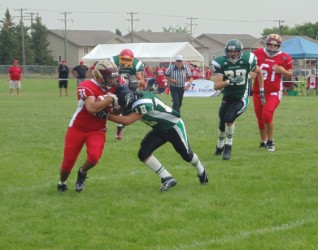Article Origin
Volume
Issue
Year
The participating clubs have changed over the years, yet the goals of the 6 Nations Challenge have remained the same, to develop the skills of youth football players and increase the participation of Aboriginal players in the sport.
This year the fourth annual 6 Nations Challenge was held in Brandon, Man. The week-long event, which concluded on Aug. 17, attracted six-a-side tackle football squads from Quebec, Saskatchewan and Manitoba.
Six-a-side football has grown in popularity in recent years, especially in some Aboriginal communities that do not have enough players to form a standard football team, which features 12 players per team on the field.
The 6 Nations Challenge was first held in Saskatoon in 2010. That event included players from Saskatchewan and Quebec.
The following year players from those two provinces were also joined by players from Prince Edward Island as the 2011 event was staged in Charlottetown. And then last year’s event, which was held in Ottawa, featured players from Quebec, Saskatchewan and Ontario.
One thing that has remained constant over the four years though has been the involvement of Trevor Allen Monaghan.
The 39-year-old Cree, who played his collegiate ball at the University of Ottawa from 1997 through 2001, is one of the individuals who helped launch the program. And he’s been coaching the Quebec team participants since Day 1.
“It’s easier to teach skills when you have smaller numbers,’ said Monaghan, who works as the manager of a fitness centre in Chisasibi, Que.
Since a team only needs six players on the field at a time, some six-a-side squads can carry as few as 15 players on their roster. Compare that to regular football clubs who have double and sometimes triple that many players.
Monaghan believes the sport teaches youth about teamwork, leadership and discipline, skills that can be useful in later life.
Plus, since they tend to play a variety of positions in six-a-side football, Monaghan believes those that compete in this version of the game are greatly benefitting.
“They are better groomed to play 12-man football,” he said.
At the 6 Nations Challenge players spend a good chunk of the week being coached on various football fundamentals. And they also get to participate in a skills competition.
But during the week squads also compete in a shootout challenge, where teams are given 10 offensive plays starting at their opponents’ 45-yard line to see how many times they can score.
Plus, the event is capped off by mini-games featuring all of the participating squads.
“Once the equipment goes on, it gets competitive,” Monaghan said. “After the game though, everybody is friends. The kids are now becoming friends across the country with each other on Facebook. There’s nothing wrong with that, making friends through football.”
Shannon Donovan, the executive director of Football Canada, the governing body for the sport in the country, said not all gridiron officials from across Canada are in favour of the event’s current format.
“There’s no trophy at the end of the day,” she said. “Everybody gets the same medal for participating.”
Donovan believes this is one of the reasons why some provincial football governing bodies have been reluctant to send representatives to the 6 Nations Challenge.
“There are some people that like it’s about participation and development,” she said. “But on the other side there’s people that want a championship. They want the best six-on-six players out there to come together and play for a championship. It is something we discuss every year.”
Donovan believes it could be another three to four years before most of the provinces are represented at the event.
“I’m hoping at least half of (the provinces) want to come out and be a part of it in the next year or two,” said Monaghan.
And he believes organizers will adopt a championship format.
“I think that’s where it’s heading,” he said.
This year’s 6 Nations Challenge was held at Brandon University. The host Manitoba side emerged victorious in all of its shootout and mini-games.
In its pair of shootout outings, Manitoba defeated Quebec 24-22 and beat Saskatchewan 32-26.
The Manitoba side then registered convincing wins in their mini-games, downing Saskatchewan 44-14 and Quebec 50-20.
Though a site has yet to be officially announced, Donovan is hoping next year’s event will be staged in Regina. She’s hoping the event will be held roughly the same dates as the North American Indigenous Games, which will also be in Regina.
- 2529 views

